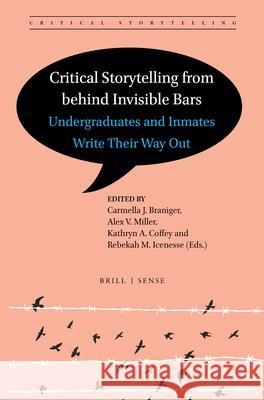Critical Storytelling from behind Invisible Bars: Undergraduates and Inmates Write Their Way Out » książka
Critical Storytelling from behind Invisible Bars: Undergraduates and Inmates Write Their Way Out
ISBN-13: 9789004441644 / Angielski / Miękka / 2020 / 196 str.
Critical Storytelling from behind Invisible Bars: Undergraduates and Inmates Write Their Way Out
ISBN-13: 9789004441644 / Angielski / Miękka / 2020 / 196 str.
(netto: 161,88 VAT: 5%)
Najniższa cena z 30 dni: 162,61
ok. 22 dni roboczych.
Darmowa dostawa!
Critical stories are narratives that recount the writer’s experiences, situating those experiences in broader cultural contexts. In this volume of Critical Storytelling, marginalized, excluded, and oppressed peoples share insights from their liminality to help readers learn from their perspectives on living from behind invisible bars. Female inmates at Decatur’s Correctional Center and the undergraduate Millikin University students who worked with them come together to give voice to their specific histories of living from behind invisibile bars and pose important questions to the reader about inciting change for the future. Specifically, the voices in this volume seek to expose, analyze, and challenge deeply-entrenched narratives and characterizations of incarcerated women, whose histories are often marked by sexual abuse, domestic violence, poverty, PTSD, a lack of education, housing insecurity, mental illness, and substance addiction. These silenced female inmate voices need to be heard and contextualized within the larger metanarrative of prison literature. Through telling critical stories, these writers attempt to: sustain recovery from trauma, make positive changes and informed decisions, create a real sense of empowerment, strengthen their capacity to exercise personal agency, and inspire audiences to create change far outside the reaches of physical and metaphorical bars. Contributors are: Anonymous, Soren Belle, Megan Batty, Dwight G. Brown, Jr., Sandra Brown, Kathryn Coffey, Kelly Cunningham, Paiten Hamilton, Kathlyn J. Housh, Rebekah Icenesse, Kala Keller, Jelisa Lovette, Bric Martin, Amanda Minetti, Laura Nearing, Angie Oaks, Claire Prendergast, Cara Quiett, J. M. Spence, Noah Villarreal and Alisha Walker.











